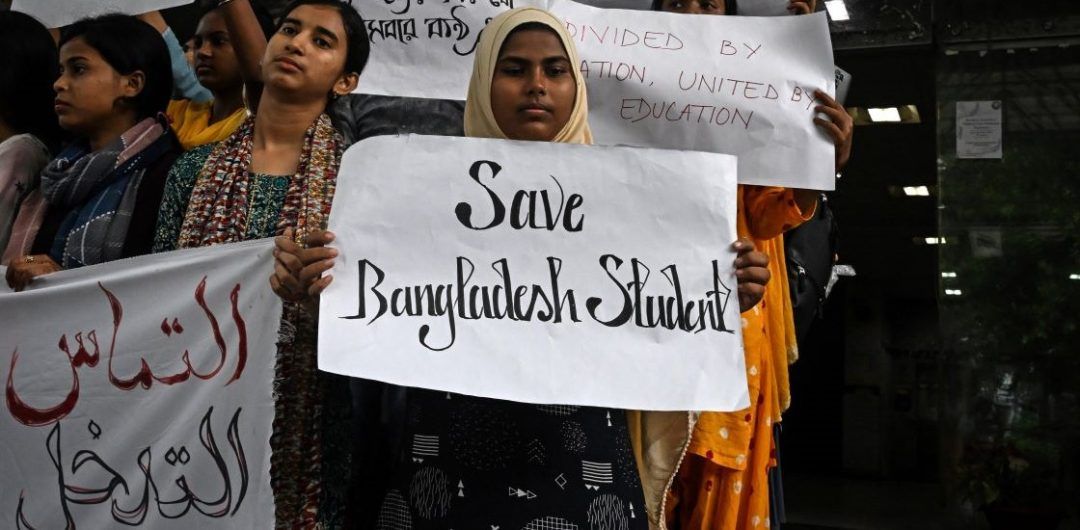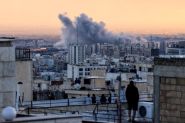- Home
- Middle East
- About 2,500 Arrests in Bangladesh Following Protests

©(Dibyangshu Sarkar / AFP)
The number of arrests in days of violence in Bangladesh passed the 2,500 mark in an AFP tally on Tuesday, after protests over employment quotas sparked widespread unrest.
At least 174 people have died, including several police officers, according to a separate AFP count of victims reported by police and hospitals.
What began as demonstrations against politicised admission quotas for sought-after government jobs snowballed last week into some of the worst unrest of Prime Minister Sheikh Hasina's tenure.
The student group leading the demonstrations suspended its protests Monday for 48 hours, with its leader saying they had not wanted reform "at the expense of so much blood."
A curfew has been imposed and soldiers deployed across the South Asian country, while a nationwide internet blackout since Thursday has drastically restricted the flow of information.
On Sunday, the Supreme Court pared back the number of reserved jobs for specific groups, including the descendants of "freedom fighters" from Bangladesh's 1971 liberation war against Pakistan.
The restrictions remained in place Tuesday after the army chief said the law and order situation had been brought "under control."
There was a heavy military presence in Dhaka on Tuesday, with bunkers set up at some intersections and key roads blocked with barbed wire.
But more people were on the streets, as were hundreds of rickshaws.
The authorities' response to the protests has been widely criticised, with Bangladeshi Nobel Peace Prize laureate Muhammad Yunus urging "world leaders and the United Nations to do everything within their powers to end the violence" in a statement.
The respected 83-year-old economist is credited with lifting millions out of poverty with his pioneering microfinance bank but earned the enmity of Hasina, who has accused him of "sucking blood" from the poor.
With around 18 million young people in Bangladesh out of work, according to government figures, the June reintroduction of the quota scheme -- halted since 2018 -- deeply upset graduates facing an acute jobs crisis.
With AFP
At least 174 people have died, including several police officers, according to a separate AFP count of victims reported by police and hospitals.
What began as demonstrations against politicised admission quotas for sought-after government jobs snowballed last week into some of the worst unrest of Prime Minister Sheikh Hasina's tenure.
The student group leading the demonstrations suspended its protests Monday for 48 hours, with its leader saying they had not wanted reform "at the expense of so much blood."
A curfew has been imposed and soldiers deployed across the South Asian country, while a nationwide internet blackout since Thursday has drastically restricted the flow of information.
On Sunday, the Supreme Court pared back the number of reserved jobs for specific groups, including the descendants of "freedom fighters" from Bangladesh's 1971 liberation war against Pakistan.
The restrictions remained in place Tuesday after the army chief said the law and order situation had been brought "under control."
There was a heavy military presence in Dhaka on Tuesday, with bunkers set up at some intersections and key roads blocked with barbed wire.
But more people were on the streets, as were hundreds of rickshaws.
The authorities' response to the protests has been widely criticised, with Bangladeshi Nobel Peace Prize laureate Muhammad Yunus urging "world leaders and the United Nations to do everything within their powers to end the violence" in a statement.
The respected 83-year-old economist is credited with lifting millions out of poverty with his pioneering microfinance bank but earned the enmity of Hasina, who has accused him of "sucking blood" from the poor.
With around 18 million young people in Bangladesh out of work, according to government figures, the June reintroduction of the quota scheme -- halted since 2018 -- deeply upset graduates facing an acute jobs crisis.
With AFP
Read more



Comments